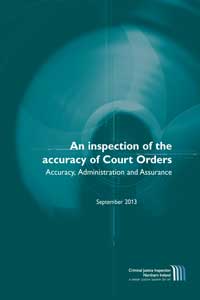
Lessons learned from Donagh sexual abuse case leads to improvement in accuracy of court orders
An independent inspection report has revealed that significant improvements made by the Northern Ireland Courts and Tribunals Service (NICTS) to the administrative arrangements in place to deal with court orders has led to an accuracy level of 99.2%.
The report published today, Thursday 12 September 2013, by Criminal Justice Inspection Northern Ireland (CJI) examined work undertaken to address weaknesses in the administration of court orders identified as part of the Inspectorate’s 2010 review of the handling of sexual abuse cases [involving the McDermott brothers] in Donagh, County Fermanagh.
“The Donagh case highlighted a number of weaknesses and while the errors did not have a material effect on the outcome or the disposal of the case, they undermined public confidence in the criminal justice system at that time,” said Brendan McGuigan, Chief Inspector of Criminal Justice in Northern Ireland.
“As a result, the NICTS undertook an extensive review of the factors leading up to the errors. It has sought to identify the main risks to the accurate recording of court orders and has invested in the development of its systems and how it engages with other criminal justice agencies” he said.
With almost 360,000 court orders issued each year and 302 different types of orders issued in January 2013 alone, Mr McGuigan stressed the work of the NICTS to improve its systems had a bearing on public safety.
“Over 70% of court orders issued have a direct impact on individuals and/or the public at large to a greater or lesser extent, the inaccurate recording of a court order and its subsequent implementation, has the potential to have a catastrophic impact on an individual or a community if it is incorrect.
“In the most serious cases it could result in a prisoner mistakenly being set free or a sex offender being released without the appropriate license conditions being imposed, therefore we welcome the work undertaken to date,” said the Chief Inspector.
During the inspection CJI found that the number of detected errors in the 12 months prior to September 2012 stood at 0.8%.
A review of high risk orders for sexual offences indicated that of 132 orders issued, there were five errors each (3.8%) of which were quickly rectified by NICTS administrators in conjunction with the relevant Judge. There were no serious outcomes in any of these instances.
These results compare favourably with a previous review of sexual offences prevention orders issued between 1997-2011 where the error rate was 18.4%.
“This inspection has shown that while the NICTS systems capture the majority of errors before any adverse outcomes occur, some are detected by other organisations such as the Northern Ireland Prison Service,” said the Chief Inspector.
“We would therefore concur that as the potential for errors will always remain, the NICTS should continue to strive for an accuracy rate of 100%, particularly in serious cases where an error could have a significant impact on a person’s liberty or imprisonment or where protective measures need to be applied before an offender is released from custody.”
Mr McGuigan said the NICTS should continue its efforts to mitigate against the risks to accuracy posed by the movement of NICTS staff, and in particular of court clerks moving out of the agency, into the wider Northern Ireland Civil Service.
The Chief Inspector has also urged the organisation to explore how existing and new technology such as a secure mobile application could be utilised to improve the process and keep legal representatives updated on the status of their cases.
In conclusion the Chief Inspector said: “While the Inspectorate has made no recommendations in this report, Inspectors identified four areas for improvement which if implemented will serve to further strengthen the existing arrangements.”